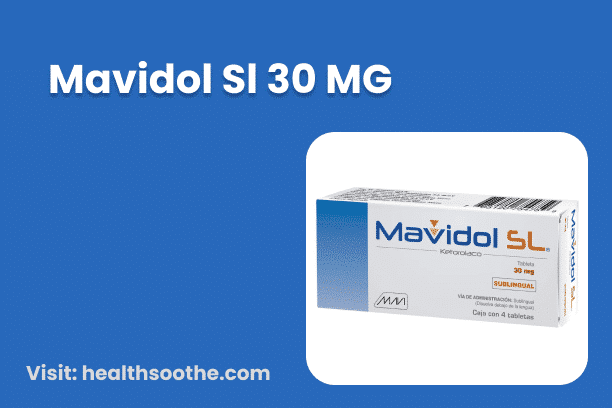Mavidol SL, classified as a non-steroidal anti-inflammatory drug (NSAID), finds application within hospital settings for the purpose of alleviating post-operative pain.
Containing ketorolac tromethamine as its active component, it possesses the capability to mitigate pain, diminish swelling, alleviate redness, and counteract infection.
Mavidol SL 30 mg
Mavidol SL 30 mg is a medication that serves distinct purposes in pain management and relief. This drug contains the active ingredient ketorolac tromethamine, which belongs to the class of non-steroidal anti-inflammatory drugs (NSAIDs). While it effectively addresses pain and inflammation, it’s essential to be aware of potential side effects that might arise during its use.
Read Also: Shelf life of zofran (Zofran Oral: Uses, Side Effects, Interactions)
Refrain from utilizing this medication if any of the following conditions apply:
- If you display hypersensitivity to tromethamine, ketorolac, or medications containing ketorolac.
- If your body reacts to cetylsalicylic acid or other pain, fever, and inflammation-relieving drugs with symptoms like skin rash, hives, angioedema, asthma-related issues, nasal cavity inflammation, or cold symptoms.
- If you possess a history of asthma.
- If you have experienced gastrointestinal complications such as ulcers and bleeding.
- In cases of severe heart failure.
- After a brain hemorrhage.
- If low blood volume arises due to substantial bleeding or severe dehydration.
- In instances of moderate or severe kidney impairment or susceptibility to kidney failure.
- For individuals with liver cirrhosis or severe hepatitis.
- If you have a tendency to bleed easily (e.g., hemophilia).
- While taking medications that hinder blood clotting (e.g., warfarin, heparin, or clopidogrel).
- Concurrent use of other non-steroidal anti-inflammatory drugs like aspirin and ibuprofen, and in patients receiving probenecid (used for gout treatment) or pentoxifylline (used for circulatory issues).
- When undergoing intensive diuretic treatment.
- If you are using pain-relieving medications before and after surgical procedures.
- When there is a substantial risk of post-operative bleeding or if bleeding persists after surgery.
- If you are below the age of sixteen.
- Not recommended for managing mild or chronic pain types.
This medication might induce feelings of tiredness, drowsiness, dizziness, compromised balance and vision, depression, and sleep disturbances. If any of these effects manifest, it is advisable to seek guidance from a medical professional.
Pregnancy and Breastfeeding Considerations
Prior to using this medication, it’s important to consult your doctor or pharmacist for guidance.
The safety of this medicinal product for human use during pregnancy has not been established. There are potential risks associated with its effects on both pregnancy progression and the well-being of the unborn baby or newborn.
Due to these potential risks, it’s advised not to use Mavidol SL during pregnancy. In fact, its usage might even pose challenges for conception.
If you become aware of your pregnancy during the course of Mavidol SL treatment, it’s crucial to promptly seek advice from your doctor or pharmacist.
Additionally, since the substance called ketorolac trometamol in Mavidol can pass into breast milk, it’s recommended to avoid using Mavidol SL if you are breastfeeding. If you continue to use the medication, discontinuing breastfeeding is advisable.
Usage Guidelines for Mavidol SL
Mavidol should be taken only in the doses prescribed by your doctor and with their recommendation.
For adults, the suggested dosage is one tablet every 4-6 hours, up to a maximum of 40 mg per day.
This medication should not be used for more than 5 days unless otherwise directed by a doctor.
The tablets should be swallowed whole and not chewed.
Mavidol SL is not suitable for children under 16 years of age.
If you are 65 years of age or older, exercise caution when using this medicine. The elderly population is at a higher risk of experiencing serious side effects.
Your doctor will conduct regular monitoring to ensure your well-being and safety during the course of treatment.
Potential Side Effects of Mavidol SL 30 mg
In the event that you experience any of the subsequent side effects, discontinue the use of this medication and promptly get in touch with your doctor:
- Gastrointestinal Issues
- Bleeding from Surgical Wound Area
- Nosebleeds
- Blood Leakage from Veins into Tissues
- Low Blood Pressure (Hypotension)
- Blood-Filled Swelling
- Blood Imbalance (Excess Potassium, Insufficient Sodium)
- Blood-Related Problems like Anemia, Low Platelet Count, or White Blood Cell Count Changes
- Sleep Disturbances or Changes in Sleep Patterns
- Psychological Problems
- Headache
- Tingling Sensations, Numbness in Hands and Feet
- Hyperactivity
- Vision and Hearing Impairments
- Dizziness Leading to Balance Issues
- Swelling of Hands, Feet, and Legs
- Palpitations, Slow Heartbeat, or High Blood Pressure
- Sudden Weight Gain
- Breathing Difficulties
- Photosensitivity, Skin Redness, Hives, Acne, Raised Skin Rashes
- Itching or Sweating, Pale Skin, or Facial and Neck Redness
- Blood in Urine and Kidney Problems
- Altered Urination Frequency
- Pain on the Side of the Body
- Pain at Injection Site, Accompanied by Fever
- Thirst, Dry Mouth, Taste Alterations, Fever, Weight Gain, or Weight Loss
- Fatigue and General Malaise
- Mouth Sores
- Muscle Spasms, Pain, Weakness
- Difficulty Conceiving in Women
It’s important to consult your doctor if you encounter any of these side effects. Remember, immediate medical attention might be necessary in certain cases. Your healthcare provider can provide guidance on managing these side effects and determine the best course of action based on your individual situation.





